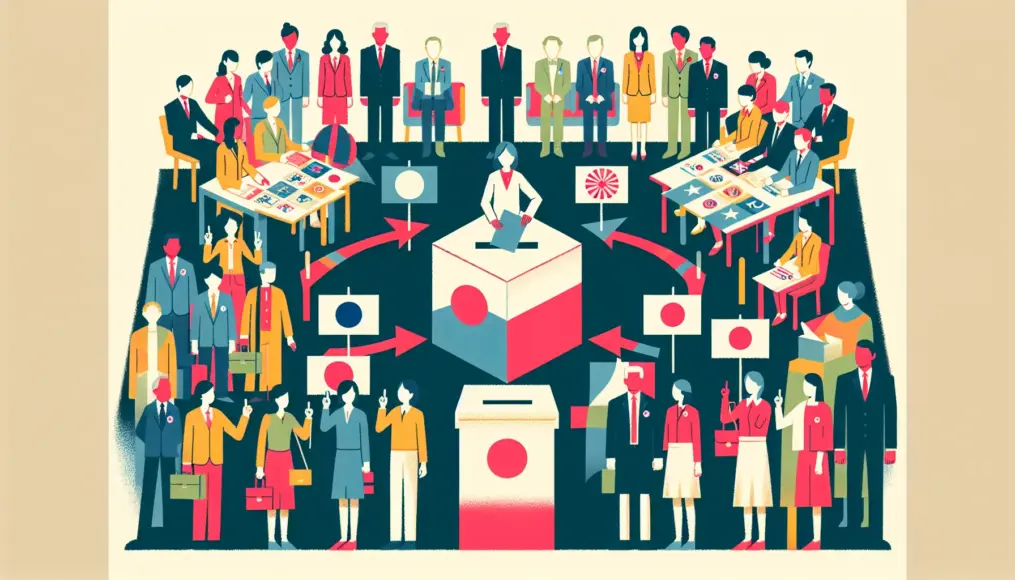Japan’s electoral system serves as a vital cornerstone of our democracy. However, many people may not be fully aware of its history and mechanics. In this article, we will delve into the origins of the electoral system and explore the challenges it faces in modern times.
Understanding the electoral system is essential for participating in politics. As we confront contemporary issues such as declining voter turnout and the need for electoral reform, it’s crucial to consider how we can engage with these matters.
Additionally, we will examine how the electoral system impacts society and discuss prospects for the future. By deepening our knowledge, we can contribute to building a better society.
- Explore the historical background of Japan’s electoral system
- Reflect on the importance of the electoral system through modern challenges
- Discuss future reform proposals and the role of citizens
The Evolution of Japan’s Electoral System
Japan’s electoral system has undergone significant transformation since the establishment of democracy after World War II. This evolution reflects the impact of war and social changes, highlighting the increasing importance of citizens’ roles in politics. In this article, we will explore the changes in the electoral system post-war and how major political parties have influenced these developments.
Understanding the electoral system is essential for political participation. By looking back at history, we gain insight into the background that shaped today’s electoral framework, helping us reflect on the future of politics.
Post-War Transformations
After the war, Japan introduced a new electoral system. The new constitution, enacted in 1946, granted equal voting rights to all adults, laying the foundation for a democratic society. During this period, elections became a vital means of expressing the will of the people, leading to increased political participation among citizens.
Furthermore, electoral reforms have evolved in response to the needs of the times. Notably, the impact of party platforms and policies on elections has grown, diversifying electoral strategies. Such transformations have significantly influenced Japan’s political culture.
- The new constitution established equal voting rights.
- Increased political participation strengthened democracy.
- The significance of party platforms and policies has gained importance in elections.
Influence of Major Political Parties
The dynamics of major political parties have had a profound impact on the electoral system. Particularly, the relationship between the Liberal Democratic Party (LDP) and opposition parties plays a crucial role in shaping electoral strategies and policy development. The competition between parties intensifies with each election, leading to changes in the electoral system itself.
Additionally, various factors such as candidate selection, fundraising, and campaign tactics influence competition during elections. As a result, the electoral system must continuously adapt. Understanding the influence of political parties allows for a deeper comprehension of the current state of the electoral system.
To deepen your understanding of the electoral system, it’s also important to expand your knowledge about its actual implementation and its effects. If this article piqued your interest, you might also enjoy our piece on “Exploring the Functions and Impact of Unified Local Elections.” This link will provide further insights into the background of the electoral system and the significance of citizen participation.
- The relationship between the LDP and opposition parties affects the electoral system.
- Electoral strategies and candidate selection influence competition.
- The electoral system must constantly evolve in response to party dynamics.
Challenges Facing Modern Election Systems
Japan’s contemporary election system is grappling with numerous challenges. One of the most pressing issues is the decline in voter turnout, which raises concerns about diminishing public interest in elections. This trend not only undermines citizens’ trust in politics but also threatens the very foundation of democracy. The push for reform in the electoral system stems from these pressing issues.
For an election system to function effectively, active participation from the public is essential. There is a need for measures to increase voter turnout and reforms to the system itself. Addressing these challenges could pave the way for a stronger democracy.
Declining Voter Turnout
In recent years, voter turnout in Japan has been steadily declining. This trend is particularly pronounced among younger voters, indicating a waning interest in political matters. This situation can be attributed to politicians and parties failing to engage with the voices of young people. Additionally, there is a lack of information dissemination and awareness-raising activities during elections, which further exacerbates the issue.
The drop in voter turnout can lead to skewed election results. When the opinions of specific generations or demographics are less represented, it raises concerns about fairness in policy-making. Various initiatives will be necessary to tackle this problem.
- Current situation of declining voter turnout
- Weak interest in politics among youth
- Impact of insufficient information and awareness activities
The Necessity for Electoral Reform
Many elements within the modern election system require reform. In particular, it is crucial to revisit voting methods, the setting of electoral districts, and the selection process for candidates. The existing system can sometimes favor specific parties or candidates, making fundamental reform essential for achieving a fairer election process.
Moreover, reforming the election system is vital for encouraging political participation among the populace. By implementing a more transparent system, public trust can be bolstered, potentially rekindling interest in elections. Progress in such reforms will contribute to nurturing a healthy democracy.
- Numerous elements in the election system require reform
- Current system can favor specific parties
- A transparent system may enhance public trust
Impact on Society
The electoral system significantly influences society as a whole. Particularly in the context of democratic development and political stability, the role of elections is crucial. By reflecting the opinions of the populace, elections enable government policies to respond to the needs of citizens. In this sense, the electoral system serves not only as a political mechanism but also as a foundation for the healthy development of society.
Moreover, when the electoral system functions properly, it fosters political stability. When citizens participate in politics and express their opinions, it serves as a means to alleviate societal grievances and helps build a stable community. Given these perspectives, it’s essential to reaffirm the importance of the electoral system.
Development of Democracy
The electoral system is a key element in the development of democracy. Through elections, citizens can choose their representatives, which increases their sense of participation in politics. When people can voice their opinions, it enhances political transparency and strengthens oversight of government actions.
Additionally, elections can bring new political issues and the voices of citizens to the forefront. This compels politicians and parties to listen to the needs of the public and develop better policies. Such processes contribute to the deepening of democracy.
- The electoral system contributes to the development of democracy
- Increased civic participation enhances political transparency
- New political issues emerge, influencing policy-making
Political Stability
The electoral system plays a vital role in maintaining political stability. When citizens express their opinions through elections, it serves as a means to address societal grievances and conflicts. By enabling the public to choose their representatives, elections foster trust in the government.
Furthermore, a stable electoral system contributes to the development of nations and regions. Political stability is directly linked to economic growth and social development, making it essential for the electoral system to function effectively. This creates an environment where citizens can live with peace of mind.
- Elections serve as a means to resolve societal grievances and conflicts
- Public trust supports the stability of government
- A stable electoral system contributes to economic growth and social development
Looking Ahead: The Future of Japan’s Election System
The future of Japan’s election system holds significant potential for various reforms. To overcome contemporary challenges and establish a healthier democracy, a reassessment of the system itself is essential. By creating an environment where citizens can actively engage in politics, we can enhance the credibility and transparency of the electoral process. In this section, we will explore specific reform proposals and the role of the citizenry.
Reforming the election system is not just about changing the rules; it’s a crucial step for individuals to become more involved in politics. As public awareness shifts, the electoral system can evolve in a more positive direction.
Possible Reforms
Several reforms have been proposed for Japan’s electoral system. For instance, diversifying voting methods and reorganizing electoral districts are among the suggestions. Notably, the introduction of online voting is being considered to boost turnout among younger voters. Such innovative approaches could lower the barriers to voting, making it easier for a broader range of people to participate.
Moreover, enhancing the transparency of information during elections is vital. This involves presenting candidates’ and parties’ policies in a clear and accessible manner. By doing so, voters will be better equipped to make informed choices based on their own opinions. If these reforms are implemented, we can expect a fairer electoral system and a stronger democracy.
- Diversification of voting methods and introduction of online voting
- Clear presentation of candidates’ and parties’ policies
- Anticipation of a more equitable electoral system
The Role of Citizens
Active participation from citizens is indispensable for the reform of the electoral system. It is crucial for each person to take an interest in politics and express their opinions. This engagement can serve as a catalyst for positive changes in the electoral system. Additionally, deepening understanding of the electoral process is also a vital part of a citizen’s role.
Furthermore, participating in political activities and volunteering within local communities is another way citizens can contribute. Through these efforts, interest in politics can grow, fostering a greater awareness leading up to elections. When citizens unite to work towards improving the electoral system, they pave the way for a brighter future.
If you understand the importance of participating in the reform of the electoral system, you might also want to check out this article, “Why is Voter Turnout Declining? Exploring Causes and Solutions.” It provides a multifaceted analysis of the factors behind declining voter turnout and suggests concrete steps for citizens to engage in the political process. This will help deepen your understanding of the information necessary to enhance the credibility of the electoral system.
- Active political participation from citizens is essential
- A deeper understanding of the electoral process is required
- Increasing interest through community activities
Conclusion
Japan’s electoral system plays a crucial role in supporting democracy. By understanding its historical context and contemporary challenges, we can reaffirm the significance of this system. As we face modern issues like declining voter turnout and the need for electoral reforms, it’s essential for citizens to engage actively in the political process.
Looking ahead, it’s also important to consider the potential for reform and the role that the public can play in shaping the future. A well-functioning electoral system is a pathway to a better society. When each of us takes an interest in and participates in politics, we contribute to the development of democracy.
- Japan’s electoral system is the foundation of democracy.
- There is a demand for increased voter turnout and reform.
- Citizen participation will shape the future of politics.
Let’s continue to think about the electoral system and take action to build a better society together. We would love to hear your thoughts and feedback in the comments!



Comment